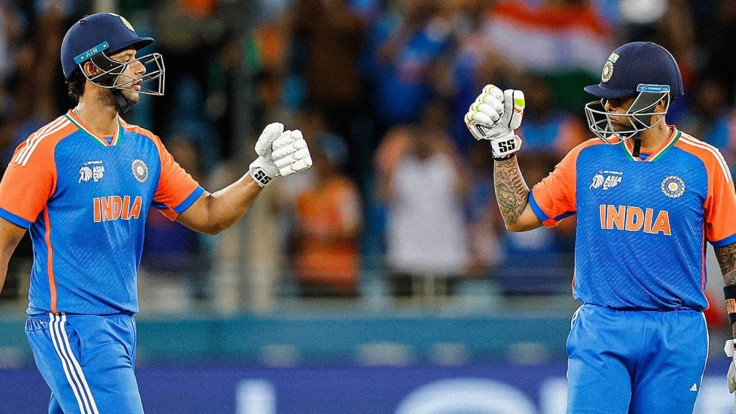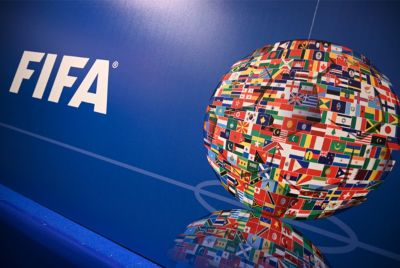Why Team India Refused to Shake Hands With Pakistan After Crushing Asia Cup 2025 Win in Dubai
For Team India, the win was a symbolic moment tied to recent national grief and anger

India crushed Pakistan by seven wickets in the Asia Cup 2025 as the two fierce rivals met in Dubai for a match surrounded by political scrutiny. But it was the refusal to shake hands after the match that sparked headlines across the world. The reason behind it is one that is entrenched in the geopolitical history and horrifying recent incidents.
India decimates Pakistan in Dubai
India dominated the fiery clash from start to finish, Pakistan was outmatched and outclassed at every stage of the game. Pakistan struggled to post a competitive total, and fell prey to disciplined Indian bowling that choked the runs at critical stages.
This is not the first time Pakistan's cricket team has failed to stand against India, as reports suggest they have been criticised for it for a long time. As for this match, Suryakumar Yadav, leading as captain of the Indian team, anchored the chase with composed innings as India stormed home with seven wickets to spare in a show of absolute might over Pakistan.
The atmosphere in the Dubai International Stadium was electric and Indian supporters were outnumbering their rivals in the stands. This created a recipe for the perfect victory for the men in blue.
What fans later realized was that the victory was more than a cricketing win. For Team India, it became a symbolic moment tied to recent national grief and anger.
India's symbolic refusal to shake hands
When the final wicket fell in Dubai, Indian players celebrated amongst themselves but did not line up for the customary post-match handshakes. This is an age old custom in cricket and India has always participated in it gracefully. But this time, India refused to do it, in fact, they had reportedly also skipped the pre-match handshake at the toss.
According to the reports, Pakistan's management immediately lodged a formal protest with the Asian Cricket Council, claiming the act was unsporting and against cricket's traditions. However, it has seemingly gained no traction.
Yet for India's players, the decision carried clear intent. Captain Suryakumar Yadav stated after the match in the press conference that the win was dedicated to the families of the Pahalgam terror attack victims and to the armed forces of India.
'Few things in life are ahead of sportsman spirit,' he said,
signalling that the refusal was deliberate and showed Team India's solidarity and loyalty to their home and loved ones. Head coach of the Indian team Gautam Gambhir echoed this view, stressing that the team wanted to honour the sacrifices made by the Indian armed forces and stand with those innocent victims affected by terrorism.
The Pahalgam attack's shadow over the match
The decision not to engage in handshakes cannot be separated from the backdrop of the 22 April Pahalgam terror attack in Jammu and Kashmir in India, where 26 innocent civilians, including tourists, were killed mercilessly.
The massacre shook the country and led to widespread mourning and outrage. India responded with a counter-terror operation named 'Operation Sindoor', that was widely regarded by India's biggest crackdown on terror in recent memory.
For many Indians, the sight of India playing against Pakistan in cricket so soon after such bloodshed was difficult to accept and it was heavily criticised as post Operation Sindoor, India has still not restored relations with Pakistan.
Families of victims of The Pahalgam terrorist attack openly spoke against the match. This sentiment was echoes across political circles, with calls for a boycott gaining momentum in the weeks leading up to the game.
Pakistan's reaction and diplomatic fallout
After India decimated Pakistan in the match and refused to shake hands after, Pakistan captain Salman Ali Agha refused to attend the post-match presentation ceremony in protest reportedly. Despite Pakistan's complaints, the Board of Control for Cricket in India (BCCI) has so far stood by the team and its decision as of this writing.
BCCI's stance aligns with the broader public mood in India right now, where many saw the refusal as an appropriate and necessary message after the Pahalgam attack. The message being that India is no longer willing to put up with Pakistan in any avenue be it geopolitics, international relations and even cricket.
Why the stance resonates in India
For Indian fans, the refusal to shake hands was not seen as a breach of etiquette but as a statement of resolve after years of tensions with Pakistan. With memories of the April attack still raw in the minds of Indians, several Indian fans believed normal sporting gestures risked trivialising the trauma of the innocent victims of the terror attack.
In this context, the act of withholding a handshake became a form of symbolic protest: a refusal to normalise ties until there is accountability for terror that India alleges Pakistan with according to reports.
Further reports suggest that several political figures and commentators praised this move by India, calling it a dignified reminder that cricket cannot be separated from national sentiment when lives have been lost especially since cricket is the most prevalent sport in India.
An easy conquest on the pitch
While the handshake controversy dominated headlines, the cricket itself left little doubt about India's superiority over Pakistan. Pakistan's batting faltered against Indian spin, and their middle order crumbled under scoreboard pressure.
In reply, India chased down the target clinically and with subtle grace. The victory reinforced India's position as one of the best teams in the world and one of the top picks to win the Asia Cup while raising fresh questions about Pakistan's form that have been lingering for a long time.
The win carried an intensity rarely matched in cricket's fiercest rivalry. It was not only about runs and wickets but also about symbolism, pride, and national identity for India it seems.
Looking ahead in the Asia Cup
India's commanding victory means the two sides could meet again in later stages of the Asia Cup. According to latest reports, tournament rules and scheduling make further encounters possible if both teams advance, which India already has after this win. Whether or not the no-handshake stance will be repeated in future matches remains to be seen, but the precedent has already been set by India.
Pakistan's protest is now in the hands of the Asian Cricket Council. Any potential penalties for breaching tournament protocol have yet to be decided, but Indian officials are reportedly confident the team acted within its rights.
As India progresses in the Asia Cup, the team's stance is likely to remain a talking point far beyond the boundary ropes. It is a reminder that, in this rivalry, every gesture carries weight far beyond cricket.
© Copyright IBTimes 2025. All rights reserved.





















